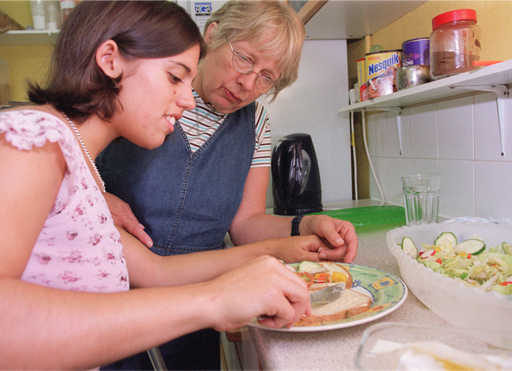4.1 An ongoing responsibility
So far the discussion in this session has largely been about people who continue to live with their family, usually parents, well into adulthood. However, this is not everyone. Some young people with learning disabilities do leave home, some to live semi-independently, perhaps with support from paid staff. Despite this, families report that they continue to feel a sense of responsibility.
For example, Leah is 30 years old. She has a moderate learning disability. She lives in her own flat with paid support workers visiting and her parents also live nearby. She receives Direct Payments, meaning she is in charge of her own budget, and employs her own support. Despite this sense of independence, Sheila, Leah’s mum, explains that she is still responsible for making sure everything runs smoothly – and fighting for Leah’s rights:
My daughter’s support has been in the process of being reviewed for a year now. This involves a stop/start series of meetings with care managers and seniors. The bottom line is a cut in her hours but with no clear justification or assessment. An assessment was undertaken in the spring and it was called an ‘outcomes focussed assessment’. The only outcome, however, was a reduction in support they will pay for from 35 hours per week (too much as everyone agrees) to 7 hours per week. The only reason given was that she is ‘independent’.
We robustly challenged this ‘assessment’ and it ended up (eventually) with a senior council officer declaring it inadequate and the whole sorry process started again. Only yesterday we had an email from yet another care manager saying that Leah’s support would be reduced to ‘take account of her outcomes’ (as yet not known or documented).
Sheila’s experiences are a reminder that parents sometimes feel that the battle to get the best for their sons and daughters is never ending, despite the aspiration that they can live independently.
For many people with learning disabilities, their families are their best advocates. However, some might argue that parents need to learn to ‘let go’, and accept that theirs is not the only way to offer support. It is this dilemma that you will explore next.

